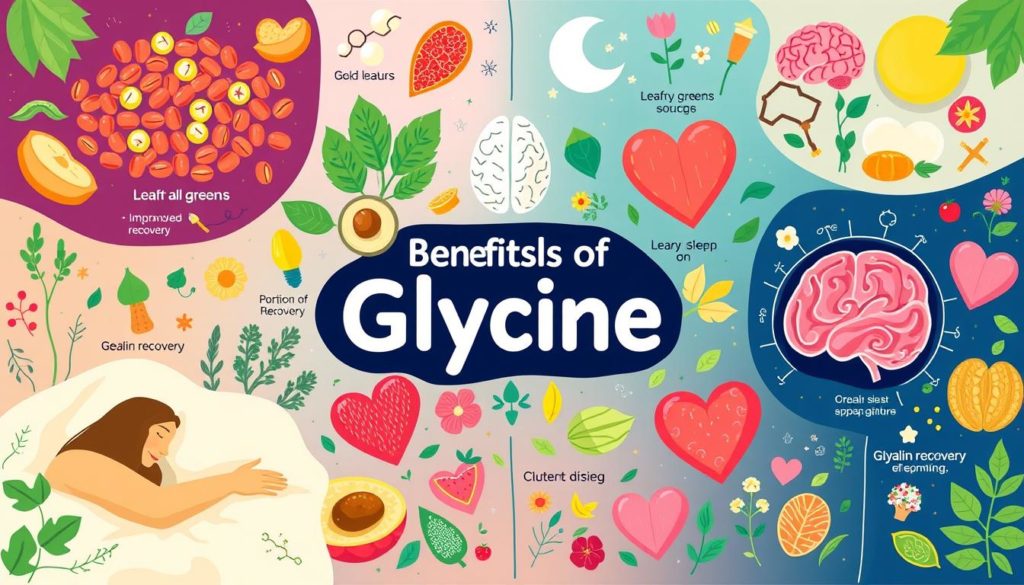Glycine makes up about 33% of the collagen in our bodies. It’s a small amino acid but very powerful in keeping us healthy. This guide is your one-stop for all info on glycine. We’ll cover how it helps improve sleep, brain function, and energy. Everything you need to know about glycine is right here.
Ready to learn more? We’ll share expert advice, the perfect amounts to use, and the top natural supplements. Glycine can do wonders for your health, whether you want to feel better overall or solve specific health concerns. Let’s dive in and see how!
Introduction to Glycine
Glycine is a vital non-essential amino acid for our bodies. It is a key building block of proteins. Understanding glycine’s biochemistry shows its big impact.

What is Glycine?
Glycine is crucial for making proteins and stands out because of its simple structure. This simplicity lets it play many roles in protein formation and body processes. Our bodies make glycine, but what we eat also affects its levels and how well it works.
Glycine in the Human Body
Glycine has many important jobs in the body. It helps with brain function and getting rid of toxins. It kicks off many processes that keep us healthy.
Organs like the liver and kidneys help make and regulate glycine. This shows how essential glycine is for our well-being.
| Function | Role of Glycine |
|---|---|
| Neurotransmitter Regulation | Acts as an inhibitory neurotransmitter in the central nervous system |
| Detoxification | Helps in cleaving toxic substances through conjugation processes |
| Collagen Formation | Major component, influencing skin, hair, and nail health |
| Metabolic Pathways | Serves as a precursor for various metabolic pathways |
Health Benefits of Glycine
Glycine, a powerful amino acid, offers many health perks for our well-being. It helps enhance brain function and promotes better sleep. These benefits highlight glycine’s importance in our daily routines.

Glycine for Sleep Improvement
Glycine helps improve our sleep quality dramatically. It calms our central nervous system and cools down our body. This leads to deeper, more refreshing sleep.
A small dose of glycine before bed can help you fall asleep quicker and stay asleep longer. This has been proven by research.
Glycine for Cognitive Function
Glycine also boosts our brain power. It aids in creating neurotransmitters that improve memory, focus, and concentration. Taking glycine regularly can sharpen your brain, enhancing overall mental performance.
Boosting Energy Levels with Glycine
Glycine can also lift your energy levels. It is a key part of creatine, which fuels energy in our cells. This boost can help improve athletic skills and lessen tiredness. Glycine is great for everyone, athletes and non-athletes alike.
How Glycine Can Improve Sleep Quality
Glycine has become popular for helping people sleep better. It helps you fall asleep faster and makes your sleep cycle better.
Taking glycine before bed can cool your body down quicker. This is important for getting ready to sleep. It matches the body’s natural way of preparing for sleep.
For better sleep with glycine, try these tips:
- Take 3 grams of glycine about an hour before bed.
- Use it with good sleep habits, like keeping the same bedtime and having a calm bedroom.
Adding glycine to your evening habits can greatly improve sleep quality. It’s a simple step with big benefits for those struggling with sleep problems.
Understanding Glycine Amino Acid
Glycine is an essential amino acid that helps our bodies in many ways. It is crucial for making proteins, the building blocks of our body. Glycine also plays a big part in keeping our metabolism running smoothly.
Glycine’s Role in Protein Formation
Glycine is very important for making proteins. It helps build enzymes, hormones, and other key proteins. Its special shape lets it work well with other amino acids. This teamwork is essential for creating complex proteins that repair muscles, support immune system, and keep cells healthy.
Other Amino Acids and Their Interaction with Glycine
Glycine works with amino acids like proline and hydroxyproline to make collagen. Collagen is key for healthy skin, joints, and bones. It also teams up with methionine and arginine to make creatine. Creatine provides energy to cells all over the body.
By working with other amino acids, glycine supports many metabolic reactions. This helps keep our bodies functioning at their best. Through these reactions, glycine ensures our body’s systems work well.
| Amino Acid | Function | Interaction with Glycine |
|---|---|---|
| Proline | Collagen Formation | Supports Skin and Joint Health |
| Methionine | Creatine Synthesis | Supports Energy Production |
| Arginine | Protein Metabolism | Enhances Immune Function |
Glycine’s teamwork with other amino acids highlights its key role in keeping us healthy.
The Ideal Glycine Dosage for Different Needs
Choosing the right glycine dosage is key to getting its full benefits safely. It’s crucial to adjust your dosage according to your health goals. Whether it’s for overall wellness or specific health issues, we’ll guide you through the dosing recommendations.
Recommended Dosages for General Health
If you want to boost your general health, taking 1 to 3 grams of glycine daily is recommended. This amount helps with collagen production and keeps the central nervous system healthy. You can easily manage this through dietary supplements.
Glycine Dosage for Specific Health Conditions
For certain health issues, the recommended glycine dose varies:
- Sleep Disorders: For better sleep, about 3 grams of glycine before bed works well.
- Anxiety: If you’re dealing with anxiety, 3-5 grams per day may help you feel calmer.
- Muscle Health: Athletes aiming for muscle repair and growth might need up to 10 grams daily.
The table below shows glycine dosage suggestions for different needs:
| Health Requirement | Recommended Dosage |
|---|---|
| General Health | 1-3 grams daily |
| Sleep Disorders | 3 grams before bedtime |
| Anxiety | 3-5 grams daily |
| Muscle Health | Up to 10 grams daily |
Remember, it’s vital to talk to a healthcare expert before beginning any new supplements or dosages. The perfect glycine amount depends on your unique health needs and status.
Safety and Potential Side Effects of Glycine
Understanding potential side effects is key when thinking about glycine supplements. It’s seen as generally safe. However, knowing and handling any bad reactions is important for your health.
Common Side Effects
Some people might notice mild issues like tummy trouble. This can include feeling sick, having loose stools, or an upset stomach. Usually, these don’t last long.
The body often gets used to the supplement after a while.
How to Minimize Risks
To lower the risks tied to glycine supplements, follow these safety steps. They can help you manage any side effects:
- Start with a low dose: First try a small amount to see how you react. Then, you can slowly increase if needed.
- Consult with a healthcare provider: This is very important if you have health issues or take other meds.
- Monitor for interactions: Keep an eye on how it mixes with any other things you’re taking.
- Stay hydrated: Drinking plenty of water can help reduce tummy trouble.
| Dosage Range | Potential Side Effects | Management Tips |
|---|---|---|
| 0.5 – 2 grams | None | N/A |
| 2 – 4 grams | Occasional mild nausea | Reduce dose and consult healthcare provider |
| 4+ grams | Nausea, loose stools | Lower dose, hydrate, reassess usage |
Glycine Supplements: What to Look For
Looking for a Glycine supplement? It’s important to choose one that offers the best quality. Here are a few tips to help you find a good one.
Choosing High-Quality Glycine Supplements
Quality is key when picking out a Glycine supplement. Opt for brands with third-party testing. They should also be open about what’s in their products and use pure glycine. NOW Foods and Thorne Research are top choices known for their strict quality controls.
Forms of Glycine Supplements Available
Glycine supplements vary in form to meet your needs. You can find:
- Powder: Easily mixed with water or other drinks.
- Capsules: Great for people always on the move.
- Tablets: These are the simplest to use correctly.
Choose what fits your lifestyle and routine best.
When and How to Take Glycine Supplements
Knowing when and how to take glycine enhances its benefits. For the best outcomes, try this:
- Take it before bed to help with sleep.
- Have it during the day to increase focus and energy.
- Pair it with a healthy diet for the full effect.
The Benefits of Glycine for Anxiety Reduction
More and more people are choosing glycine for anxiety relief and stress control. As a non-essential amino acid, glycine is important for the brain and nervous system. It helps calm the mind, which reduces anxiety symptoms.
Glycine boosts the activity of certain neurotransmitters that fight anxiety, like gamma-aminobutyric acid (GABA). This calming effect lessens brain overactivity, leading to relaxation. Relaxation is key for tackling stress and anxiety issues.
Glycine supplements can greatly aid stress management strategies. They improve mental clarity and lower anxiety, especially in stressful situations. Eating foods rich in glycine, like fish, meat, and dairy, also helps naturally.
It’s wise to talk to healthcare experts before starting glycine supplements. They can ensure its safe and effective use. Glycine might affect how other medications work. For more info on glycine and mental health, look into articles like this one.
To sum up, glycine is a hopeful natural solution for easing anxiety and managing stress. With supportive research, adding glycine to daily routines could greatly enhance peace of mind and mental health.
Using Glycine Powder: Tips and Best Practices
Adding glycine powder to your day can bring many health perks. Here’s how to get the most from glycine powder usage:
- Begin with the advised dose. Usually, this is between 3 to 5 grams each day. If you’re not sure, talk to a health expert.
- Pick the right time for taking it. For better sleep, use it about an hour before bed. For sharper thinking in the day, morning is best.
- To make it taste better, mix it with food or drinks. Try it in water, juice, smoothies, or on your oats in the morning.
- Add it to your post-exercise shake to help muscles recover.
- Mix it into soups or stews, for an easy meal boost.
- If you eat a lot of protein, glycine helps use it right.
Keep your glycine powder in a cool, dry spot away from sunlight. This keeps it working well. By using these supplementation tips, glycine can fit smoothly into your routine.
Scientific Research and Studies on Glycine
Glycine sparks big interest in science. Many clinical studies and glycine research show it might greatly improve our health. This leads to exciting scientific advancements.
Recent Findings and Breakthroughs
Recent studies show glycine can help us sleep better and think clearer. It also helps our metabolism. Top schools and research places found glycine can ease anxiety and make our minds healthier.
Future Prospects for Glycine Research
The future looks bright for glycine research. Soon, clinical studies will explore more ways glycine can heal. This could mean new treatments and amazing discoveries about this amino acid.
| Research Topic | Findings |
|---|---|
| Glycine and Sleep Quality | Enhances sleep, reduces insomnia symptoms |
| Cognitive Function | Improves memory and learning capabilities |
| Anxiety Reduction | Alleviates anxiety, promotes mental well-being | Metabolic Support | Aids in metabolic processes and energy production |
Conclusion: Making the Most of Glycine in Your Daily Routine
Adding glycine to your daily routine can greatly improve your health. This amino acid helps with sleep and boosts brain function. It’s essential for making proteins and increases energy while lowering stress.
When choosing glycine supplements, go for quality ones that meet your needs. Capsules or powders, the correct dose matters for your health. Stick to recommended dosages for safety. Consult a doctor for special health issues.
Following the right supplement plan lets you enjoy glycine’s benefits safely. Learn about any side effects to avoid problems. Understanding glycine fully helps you make the best choices for your health. Start using glycine today and see the difference it can make.
FAQ
What are the health benefits of glycine?
Glycine improves sleep, boosts brain function, and reduces anxiety. It helps make proteins and supports metabolism.
How does glycine improve sleep quality?
Glycine aids the nervous system, helping you fall asleep faster. It makes your sleep deeper and more restful.
What is the recommended glycine dosage for general health?
For health, take 3 to 5 grams of glycine daily. Always check with a doctor to find your best dose.
Are there any side effects of taking glycine supplements?
Glycine is safe for most, but some might get stomach upset or feel tired. Follow the dose guide and talk to a doctor if unsure.
Can glycine help reduce anxiety?
Yes, glycine can calm the brain and nerves. This can ease anxiety and boost mental health.
How should I take glycine supplements?
You can choose glycine in powder or capsule form. Mix powder in drinks or swallow capsules with water. Follow the product’s dosage instructions or a doctor’s advice.
What should I look for when choosing a high-quality glycine supplement?
Look for glycine products tested by third parties. Choose trusted brands and avoid unnecessary additives.
Can glycine be used to enhance cognitive function?
Yes, glycine acts as a neurotransmitter, which helps with memory and focus. It boosts mental clarity.
How does glycine interact with other amino acids?
Glycine works with other amino acids in making proteins and supports the body’s metabolic reactions. It’s key for forming collagen.
What are some tips for using glycine powder?
Mix glycine powder with water, juice, or smoothies. For best results, take it on an empty stomach. Store it in a cool and dry place.
What does research say about the future prospects of glycine?
Research into glycine looks at its benefits for metabolism, mental health, and disease management. Upcoming studies might show more uses for it.


